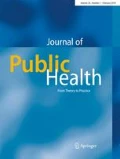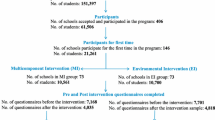Abstract
Aim
Recent scientific literature reveals a tremendous change in the health status of children and adolescents caused by malnutrition and changes in general lifestyle. Thus, the crucial value of a sustainable nutrition education has long been recognised as a major component of public health nutrition strategies. This paper describes a study that took several requirements for nutrition education programmes into account by developing and evaluating a new age-adapted version of an existing nutrition education programme.
Methods
The objective of the evaluation was to draw conclusions about the effects of the intervention’s success. A quasi-experimental field study design was utilised, arranging subjects into intervention, comparison and control groups. For each group, a pre- and post-test was assessed. Between the pre-test and post-test, a period of 4 months elapsed. In total, data from 616 children, 474 parents and 47 teachers were included in the evaluation.
Results
In general, all children in the intervention group (IG) across all ages showed a statistically significant improvement of general nutrition-related knowledge between the pre-test and post-test, which was measured in one section of the questionnaire. The comparison between intervention group (IG) and control group (CG) revealed significantly stronger improvement for the intervention group (IG). In comparison with the control group, the intervention group did not show any meaningful improvement in any of the five age groups. Parents, kindergarten-teachers and school teachers of all intervention groups reported serious changes for the health-conscious attitudes in children.
Conclusion
In summarising, the presented age-adapted nutrition education programme and its evaluation could show a clear improvement of nutrition-related knowledge and less clear improvements in nutrition-related attitudes and behavioural intentions. A sustainable prolongation of the programme could lead to even higher improvement.




Similar content being viewed by others
References
Biesalski HK, Fürst P, Kasper H, Kluthe R, Pöhlert W, Puchstein C, Stähelin HB (eds) (2004) Ernährungsmedizin, 3rd edn. Thieme, Stuttgart
Bonaccorsi G, Isola A, Tognarelli M, Lorini C, Papini D, Lanciotti E, Comodo N (2002) Modificazioni delle abitudini alimentari in un campione di bambini in seguito all’effetuatione di un percorso educativo all’interno della scuola elementare. Ann Ig 14:243–251
Caroli M (2001) Die Mutter-Kind-Beziehung in der Ernährungserziehung. [Online aufgerufen am 08.03.2004] http://www.uinlever.ch
Cohen J (1988) Statistical power analysis for the behavioral sciences. Erlbaum, New York
Dixey R, Heindl I, Loureiro, I, Pérez-Rodrigo C, Snel J, Warnking P (1999) Healthy eating for young people in Europe. A school-based nutrition education guide. WHO Regional Office for Europe, Copenhagen
Ebbeling CB, Pawlak DB, Ludwig DS (2002) Childhood obesity: public health crisis, common sense cure. Lancet 360:473–482
Friel S, Kelleher C, Campbell P, Nolan G (1999) Evaluation of the nutrition education at primary school (NEAPS). Publ Health Nutr 2:549–555
Hart KH, Herriot A, Bishop JA, Truby H (2003) Promoting healthy diet and exercise patterns amongst primary school children: a qualitative investigation of parental perspectives. J Hum Nutr Diet 16:89–96
Hebebrandt J, Wermter AK, Hinney A (2004) Adipositas. Monatsschr Kinderheilkd 152:870–876
Herbert E, Schneider A, Zöllner I (2001) Übergewicht bei Kindern. In: Landesgesundheitsamt Baden-Würtemberg (eds) Jahresbericht 2001. Stuttgart, 2002, pp 38–40
Himmerich S, Gedrich K, Seiler H, Linseisen J, Karg G (2004) Lässt sich das Ernährungsverhalten über Ernährungswissen beeinflussen? Proc Germ Nutr Soc 6:53
Holl RW, Wabitsch M, Heinze E (2001) Typ-2-Diabetes mellitus bei Kindern und Jugendlichen. Monatsschr Kinderheilkd 149:660–669
Jaensch N, Poggensee G, Westenhöfer J, Hamm M (1996) Empirische Untersuchung der Effektivität von Ernährungserziehung in der Kindertagesstätte. [Online aufgerufen am 08.03.2004] URL: http://www.westenhöfer.de/abstracts/dge97.html
Kersting M, Alexy U, Hilbig A (2004) Alters- und Zeittrends beim Verzehr von Fett bei Säuglingen, Kindern und Jugendlichen in der DONALD-Studie. Proc Germ Nutr Soc 6:5
Krapp A, Weidenmann B (2001) Pädagogische Psychologie 4., vollständig überarbeitete Auflage. Beltz, Weinheim
BZgA (Bundeszentrale für gesundheitliche Aufklärung) (eds) (1996): Leitbegriffe der Gesundheitsförderung. Peter Sabo, Schwabenheim a.d.Selz
Kromeyer-Hauschild K (2004) Aktuelle Aspekte der Gewichtsentwicklung bei Kindern und Jugendlichen. Pädiatr Prax 64:371–378
Künast R (2004) Die Dickmacher. Warum die Deutschen immer fetter werden und was wir dagegen tun müssen. Riemann, München
Lindström M, Isacsson SO, Merlo J (2003) Increasing prevalence of overweight, obesity and physical inactivity. Two population-based studies 1986 and 1994. Eur J Publ Health 13:306–312
Livingstone B (2000) Epidemiology of childhood obesity in Europe. Eur J Pediatr 159:14–34
Lytle LA, Stone EJ, Nichamann MZ, Perry CL, Montgomery DH, Nicklas TA, Zive MM, Mitchell P, Dwyer JT, Ebzery MK, Evans MA, Galati TP (1996) Changes in nutrient intakes of elementary school children following a school-based intervention: results from the CATCH study. Prev Med 25:465–477
Manios Y, Moschandreas J, Hatzis C, Kafatos A (1999) Evaluation of a health and nutrition education program in primary school children of Crete over a three-year period. Prev Med 28:149–159
Manios Y, Moschandreas J, Hatzis C, Kafatos A (2002) Health and nutrition education in primary schools of Crete: changes in chronic disease and risk factors following a 6-year intervention programme. Br J Nutr 88:315–324
Merker N, Kress B, Manz R, Kirch W (2002) Evaluation eines Ernährungserziehungsprogramms für Kinder. Z Pädagog Psychol 16:43–50
Merx H, Reuter M, Winkler G (2004) Wie stabil sind Ernährungsmuster bei Kindern? Ernährungs-Follow-Up bei Erstklässlern im Rems-Murr-Kreis. Proc Germ Nutr Soc 6:13
Mokdad AH, Marks JS, Stroup DF, Gerberding JL (2004) Actual causes of death in the United States, 2000. JAMA 291:1238–1245
Morris JL, Zidenberg-Cherr S (2002) Garden-enhanced curriculum improves fourth-grade school children’s knowledge of nutrition and preferences for some vegetables. J Am Diet Assoc 102:91–93
Müller MJ, Asbeck I, Mast M, Langnäse K, Grund A (2001) Prevention of obesity—more than intention. Concept and first results of the Kiel Obesity Prevention Study. Int J Obes 25:66–74
Müller MJ, Mast M, Langnäse K (2002) Adipositas: Eine Herausforderung für Public Health. Z Gesundheitswiss 10:11–19
Nicklas TA, Johnson CC, Webber LS, Berenson GS (1997) School-based programs for health risk reduction. Ann N Y Acad Sci 817:208–224
Noller B, Winkler G (2002) Zur Evaluation von Ernährungserziehungsprogrammen bei Vorschulkindern: Erfahrungen mit verschiedenen Erhebungsmaterialien. Ernährungs-Umschau 49:B37-B40
Noller B, Winkler G, Waibel S (2004) Evaluation des Programms BeKi zur Ernährungserziehung bei Kindern: Erfahrungen der Fachfrauen für Kinderernährung. Proc Germ Nutr Soc 6:61
Perez-Rodrigo C, Aranceta J (2001) School-based nutrition education: lessons learned and new perspectives. Public Health Nutr 4:131–139
Perez-Rodrigo C, Aranceta J (2003) Nutrition education in schools: experiences and challenges. Eur J Clin Nutr 57 [Suppl 1]:S82-S85
Pudel V, Westenhöfer J (1998) Ernährungspsychologie. 2, überarbeitete und erweiterte Auflage. Hogrefe, Göttingen
Robert Koch-Institut (ed) (2002) Projektbeschreibung “kinder-jugend-gesundheit21.de” Studie zur Gesundheit von Kindern und Jugendlichen in Deutschland. Robert Koch-Institut, Berlin
Ryšavá L, Stransky M (2004) Verteilung des BMI bei Kindern und Jugendlichen in Tschechien. Proc Germ Nutr Soc 6:6
Schwandt P, Liepold E, Sporl-Springer F (2002) Das Präventions-Erziehungs-Programm (PEP) Nürnberg: Gesunde Ernährung kann gelernt werden. Pflege Z 55:807–808
Schwimmer JB, Burwinkle TM, Varni JW (2003) Health-related quality of life of severely obese children and adolescents. JAMA 289:1813–1819
Sempach R (2001) Adipositas bei Kindern: multidisziplinäre Gruppenprogramme zur Gewichtsreduktion in der Schweiz. Die Rolle der einzelnen Disziplinen, insbesondere die Bedeutung der Ernährungsberatung. [Online aufgerufen am 08.03.2004] http://www.uinlever.ch
SMK (Sächsisches Staatsinstitut für Bildung und Schulentwicklung ) (ed) (2003): Lehrplanentwürfe für die Grundschule. [Online aufgerufen am 03.03.2004] URL: http://www.sn.schule.de/%7Eci/1024/bg_lp_abs_gs.html
Wabitsch M (2004) Adipositas bei Kindern und Jugendlichen in Deutschland. Monatsschr Kinderheilkd 152:832–833
Wehling-Weepie AK, McCarthy AM (2002) A healthy lifestyle programme: promoting child health in schools. J Sch Nurs 18:322–328
WHO (World Health Organisation) (ed) (2000) Obesity. preventing and manging the global epidemic. WHO Technical Report Series 894, Geneva
WHO (World Health Organization) (ed) (1997) Health in Europe report on the third evaluation of progress towards health for all in the European region of WHO (1996–1997). WHO regional publications. European series no. 83
Widhalm K, Dietrich S, Dämon S, Hayr T (2004) PRESTO Prävention: Erleben, Studieren, Organisieren. Ein Projekt zur Prävention der Adipositas im Kindes- und Jugendalter. Proc Germ Nutr Soc 6:53–54
Zwiauer K (1998) Primäre Prävention von Adipositas in der Kindheit. Monatsschr Kinderheilkd [Suppl 1] 146:S88-S94
Author information
Authors and Affiliations
Corresponding author
Rights and permissions
About this article
Cite this article
Wagner, N., Meusel, D. & Kirch, W. Nutrition education for children—results and perspectives. J Public Health 13, 102–110 (2005). https://doi.org/10.1007/s10389-004-0091-9
Received:
Accepted:
Published:
Issue Date:
DOI: https://doi.org/10.1007/s10389-004-0091-9




